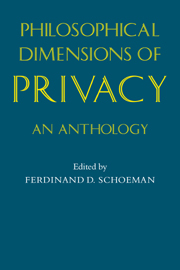Book contents
- Frontmatter
- Contents
- List of contributors
- Preface
- 1 Privacy: philosophical dimensions of the literature
- 2 Social distance and the veil
- 3 The origins of modern claims to privacy
- 4 The right to privacy [the implicit made explicit]
- 5 Privacy [a legal analysis]
- 6 Privacy as an aspect of human dignity: an answer to Dean Prosser
- 7 Privacy [a moral analysis]
- 8 Privacy, freedom, and respect for persons
- 9 Privacy and self-incrimination
- 10 Intimacy and privacy
- 11 The right to privacy
- 12 Why privacy is important
- 13 Privacy, intimacy, and personhood
- 14 Privacy: some arguments and assumptions
- 15 An economic theory of privacy
- 16 Privacy and the limits of law
- 17 Privacy and intimate information
- Selected bibliography
- Index of names
14 - Privacy: some arguments and assumptions
Published online by Cambridge University Press: 12 December 2009
- Frontmatter
- Contents
- List of contributors
- Preface
- 1 Privacy: philosophical dimensions of the literature
- 2 Social distance and the veil
- 3 The origins of modern claims to privacy
- 4 The right to privacy [the implicit made explicit]
- 5 Privacy [a legal analysis]
- 6 Privacy as an aspect of human dignity: an answer to Dean Prosser
- 7 Privacy [a moral analysis]
- 8 Privacy, freedom, and respect for persons
- 9 Privacy and self-incrimination
- 10 Intimacy and privacy
- 11 The right to privacy
- 12 Why privacy is important
- 13 Privacy, intimacy, and personhood
- 14 Privacy: some arguments and assumptions
- 15 An economic theory of privacy
- 16 Privacy and the limits of law
- 17 Privacy and intimate information
- Selected bibliography
- Index of names
Summary
In this paper I examine some issues involving privacy—issues with which the legal system of the United States has had and continues to have a good deal of concern. What I am interested in is the nature of privacy and the reasons why it might be thought important. The issues I consider have been of particular interest in recent years as changes in technology have made new ways to interfere with privacy possible. For this reason, too, I am primarily concerned with the ways in which government and other powerful institutions can and do interfere with privacy, for it is these institutions that tend to have the sophisticated instruments most at their disposal.
I consider first some distinctions that I think it important to make among different kinds of cases that involve privacy. I then consider in some detail one plausible set of arguments for the value of privacy. These arguments help to explain why the law protects privacy in some of the ways it does and to provide a possible justification for continuing to do so. Some of the arguments are not without their problems, however. And in the final section of the article I raise certain questions about them and indicate the key issues that require additional exploration before any satisfactory justification can be developed.
It is apparent that there are a number of different claims that can be made in the name of privacy.
Information
- Type
- Chapter
- Information
- Philosophical Dimensions of PrivacyAn Anthology, pp. 317 - 332Publisher: Cambridge University PressPrint publication year: 1984
Accessibility standard: Unknown
- 13
- Cited by
